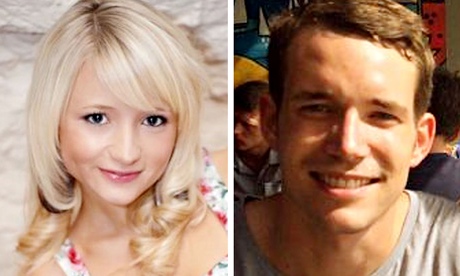
Police in Thailand insist they have “concrete” evidence linking two
Burmese men to the murders of British tourists Hannah Witheridge and
David Miller, as they denied reports that the suspects have withdrawn
their confessions.
The men, named in reports as bar workers Zaw Lin and Win Zaw Htun, are accused of the murders of Hannah, 23, and David, 24, on the island of Koh Tao in September. David, from Jersey, died from drowning and a blow to the head. Hannah, from Great Yarmouth, died from head wounds.
The two suspects, both aged 21, were charged with three offences – conspiracy to murder, conspiracy to rape and robbery – after local police said they had confessed to the killings. But reports emerged last Thursday that Aung Myo Thant, a Burmese embassy official, had formally retracted the confessions amid allegations the pair had been tortured.
A spokesman for the Royal Thai Police strongly denied the accusations of torture on Saturday as he insisted the confessions had not been withdrawn.
“They made a full confession which has been forwarded to the public attorney’s office,” said deputy police chief spokesman Colonel Kissana Phathanacharoen. “The Burmese embassy sent a representative to look at the case because two of their nationals have been charged with serious offences. They may face a maximum penalty of execution. The men are still in custody. During the inquiry they had their own legal representations.”
He added: “We had them checked by a doctor before and after the inquiry because we thought the accused may claim they were tortured. The accused persons can say anything they want. They can withdraw their confessions if they like. We have concrete evidence, including DNA evidence from Hannah’s body which matched the two suspects.”
Amnesty International has called for an investigation into the allegations of police torture. The charity cited a lawyer from the Burmese embassy’s legal team who said he had been told that police had beaten the suspect and “threatened him with electrocution”.
The Foreign and Commonwealth Office said it was concerned about the reports and expected a fair investigation. Thai police have come under domestic political pressure to solve the case amid widespread criticism of the investigation.
Hannah’s funeral took place on Saturday as friends and family gathered for a vibrant “party” send-off at St Mary the Virgin church in Hemsby, Norfolk.
http://www.theguardian.com/world/2014/oct/11/thailand-murders-hannah-witheridge-david-miller-police-say-concrete-evidence-links-burmese-suspects?CMP=twt_gu
The men, named in reports as bar workers Zaw Lin and Win Zaw Htun, are accused of the murders of Hannah, 23, and David, 24, on the island of Koh Tao in September. David, from Jersey, died from drowning and a blow to the head. Hannah, from Great Yarmouth, died from head wounds.
The two suspects, both aged 21, were charged with three offences – conspiracy to murder, conspiracy to rape and robbery – after local police said they had confessed to the killings. But reports emerged last Thursday that Aung Myo Thant, a Burmese embassy official, had formally retracted the confessions amid allegations the pair had been tortured.
A spokesman for the Royal Thai Police strongly denied the accusations of torture on Saturday as he insisted the confessions had not been withdrawn.
“They made a full confession which has been forwarded to the public attorney’s office,” said deputy police chief spokesman Colonel Kissana Phathanacharoen. “The Burmese embassy sent a representative to look at the case because two of their nationals have been charged with serious offences. They may face a maximum penalty of execution. The men are still in custody. During the inquiry they had their own legal representations.”
He added: “We had them checked by a doctor before and after the inquiry because we thought the accused may claim they were tortured. The accused persons can say anything they want. They can withdraw their confessions if they like. We have concrete evidence, including DNA evidence from Hannah’s body which matched the two suspects.”
Amnesty International has called for an investigation into the allegations of police torture. The charity cited a lawyer from the Burmese embassy’s legal team who said he had been told that police had beaten the suspect and “threatened him with electrocution”.
The Foreign and Commonwealth Office said it was concerned about the reports and expected a fair investigation. Thai police have come under domestic political pressure to solve the case amid widespread criticism of the investigation.
Hannah’s funeral took place on Saturday as friends and family gathered for a vibrant “party” send-off at St Mary the Virgin church in Hemsby, Norfolk.
http://www.theguardian.com/world/2014/oct/11/thailand-murders-hannah-witheridge-david-miller-police-say-concrete-evidence-links-burmese-suspects?CMP=twt_gu

Comments